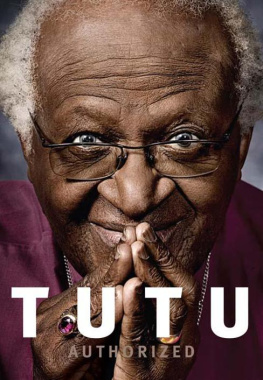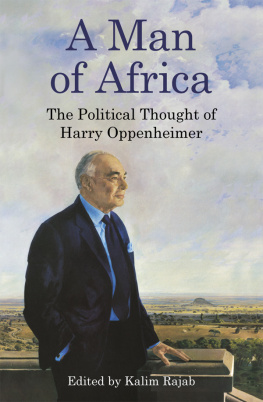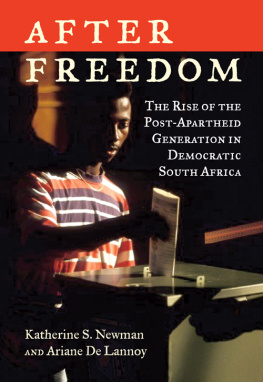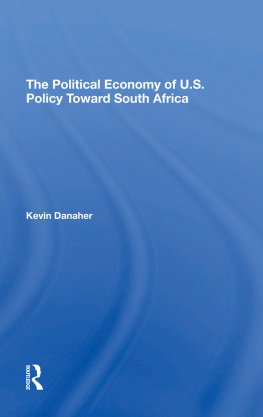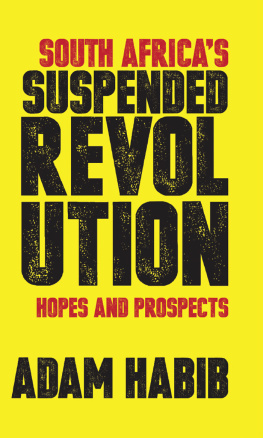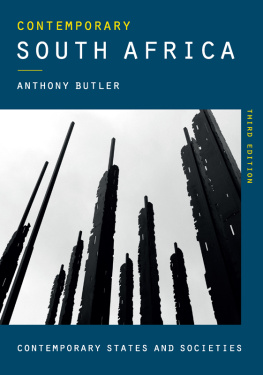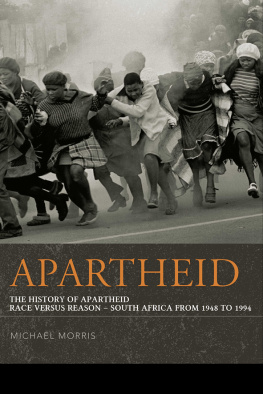All rights reserved.
No part of this publication may be reproduced or transmitted, in any form or by any means, without prior permission from the publishers or copyright holder.
Every effort has been made to trace the copyright holders and to obtain their permission for the use of copyright material. The publishers apologise for any errors or omissions and would be grateful to be notified of any corrections that should be incorporated in future editions of this book.
Excerpt(s) from The Mind of the South by W.J. Cash, copyright 1941 by Alfred A. Knopf, a division of Penguin Random House LLC, copyright renewed 1969 by Mary R. Maury. Used by permission of Alfred A. Knopf, an imprint of the Knopf Doubleday Publishing Group, a division of Penguin Random House LLC. All rights reserved.
Benjamin Pogrund, excerpts from War of Words: Memoir of a South African Journalist , pp. 79-88. Copyright 2000 by Benjamin Pogrund. Reprinted with the permission of The Permissions Company, Inc., on behalf of the Seven Stories Press, www.sevenstories.com.
All photographs are from the authors personal collection and are used by permission.
CHAPTER ONE
The Sword
MAYVILLE HOUSE at No 77 Prince Alfred Road, Queenstown, was a daunting place for a five-year-old to visit. Its south-facing front entrance was covered with creeping ivy that shaded the red brick walls, giving the impression of a damp and chilly reception. Press the bell and after a while you would hear a hesitant shuffling of feet and there would be the figure of Aunt Kate standing in the doorway, an eternally ancient and skeletal Miss Havisham dressed in a pink padded dressing gown with pink pom-pom slippers, staring at me through thick-lensed cataract spectacles that made her eyes look large and owlish.
My mother used to take me there periodically to pay duty calls, for Kate and her two sisters, Lillian and Millicent, were her aunts, three elderly spinsters who had lived together in Mayville House for most of their lives. They were the three youngest siblings of Henry Thomas Lloyd, who had arrived in South Africa at the age of six together with his father, Henry James Lloyd, a London worsted weaver. When displaced by the industrial revolution, he decided to join the legendary 1820 Settlers and seek a new life on the war-torn eastern Cape frontier with his wife Rebecca.
Six-year-old Henry Thomas Lloyd, one of eight siblings, grew up into a sturdy young frontiersman who fought in the frontier wars of 1835, 1856 and 1847. He was rewarded with a government grant that he used to build himself a large home-cum-inn called Travellers Rest, just across the Great Kei River near the mission settlement of St Marks. There he sired 21 children in his 82 years seven by his first wife, Ann Ulyate, and 14 by his second, Maria Godfrey of whom 18 survived. Maria was my mothers grandmother, a strong Scots woman with blazing red hair that she bequeathed to several of her descendants, including one of my four sons. My mother, Bernice Constance Godfrey, who was named after her, cited her often in tones of deference. Beware of women with red hair, she enjoined me. They can be difficult. Welshmen, she declared, referring to Henrys family tree, were all horse-thieves. She was a woman of emphatic views.
On Marias death, so the family story goes, Henry James informed his three youngest daughters that they should not marry but rather stay at home to care for him in his old age. Which, being dutiful Victorian maidens, they did.
And so it came about that my mother visited the Aunties to give them some much-needed company. With me in tow. The gloomy entrance to Mayville House led through a passageway into a wide sitting room with ornate oak furniture and heavy maroon velvet curtains at the windows. Stern ancestral faces glared down from the walls and the place was cluttered with china ornaments and other Victorian bric-a-brac. This was not a happy playground for a small boy.
But the Aunties would cluck over me during those visits. How to entertain me, of course, was the problem during those few hours of serious adult conversation about the doings of distant and departed relatives about whom I knew nothing.
What about Walters old sword? Aunt Kate, the imaginative one, suggested.
Ah yes, Ill get it out, responded Aunt Lillie, the eldest, as she took my hand and led me into another dingy room. There she opened a cupboard drawer and withdrew a long object wrapped in an old military blanket. Carefully, almost reverently, she carried it across the room, laid it on a bed and slowly unwrapped it.
There it lay. Not a shiny ceremonial sword, but an old battle sword rough-sharpened for use and sheathed in a battered metal scabbard, rusted and darkened with age. Hardly a toy, of course, but no matter. The impact on me was immense. I was allowed to unsheathe it. And hold it. I stared at it, at the heavy brass hilt and at the strange inscriptions on the blade partly obscured by old stains. Were those bloodstains? How many men had it decapitated? There can be no end to the mind-games of heroism and derring-do that a small boy can play with an old battle sword in his hands.
It became a ritual. On every visit to the Aunties, once every six months or so, the sword would come out and I would be allowed to wage my imaginary battles with it.
Aunt Millie, the last to go, collapsed and died when she was 97. When the will was read, I found she had left me the sword.
* * *
FOR YEARS IT lay untouched at the back of a cupboard of my own, its novelty as a small boys plaything long expired. It had no ornamental value, so it was simply stashed away along with lifes other useless collectables, its provenance and story undisclosed.
And so it might have remained but for my first visit to the United States where, during a year of study at Harvard, I came upon WJ Cashs literary masterpiece, The Mind of the South , a vivid portrait of that colourful but cruelly bigoted region and its tempestuous history. It awakened in me an awareness not only of the importance of well-presented history in understanding the idiosyncrasies of different human societies but also, to my journalistic mind, the great stories buried in the past, waiting to be exhumed.
I had done well in history at high school, scoring decent grades, but how dull it had all been: a catalogue of dreary dates, drearily presented, as uninspired teachers and even more uninspired textbooks dragged us, year after year, through the same tedious sequence of dates, grievances, conflicts, wars, peace agreements and yet more grievances. The groaning wagons of the Great Trek, the repetitiveness of the battles, the treachery of the tribal chiefs, the heroism of the white settlers and the meddlesomeness of the missionaries and the Colonial Office in London who didnt understand the true nature of the natives. It was biased and it was boring.
Now here was I consuming it greedily in a foreign land. My mind went back to those dreary schooldays and I realised what a travesty had been committed by the South African education system, what great drama had been smothered, what tragedies of human misconception in that century of frontier warfare between different cultures and value systems, what epic endurance and heroism in the task of hauling ox-wagons and whole families a thousand kilometres over the great Dragon Mountains to the plains of the highveld that stretch all the way up Africa, the agony of what was effectively a civil war between the Boers and those of British ancestry that killed thousands and scorched the earth and poisoned relations between the two white race groups. The thought struck me that if there had been a Hollywood in South Africa, the dramatising of our history would have far outshone the story of the opening up of the American West.


